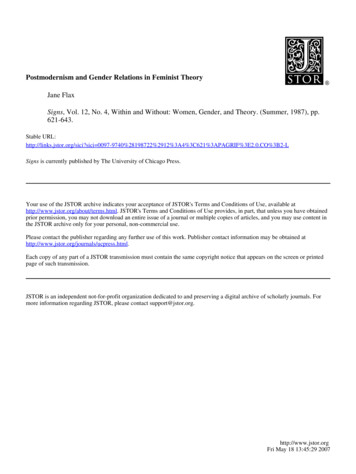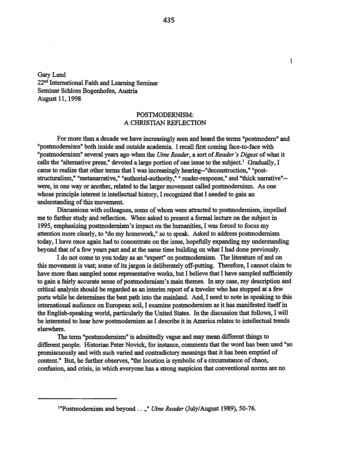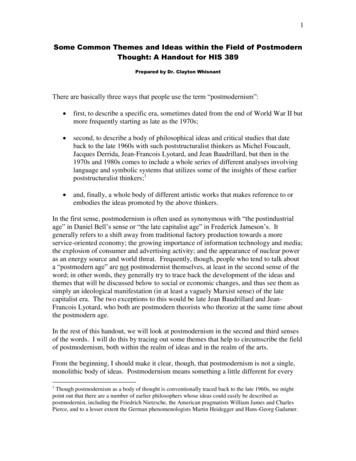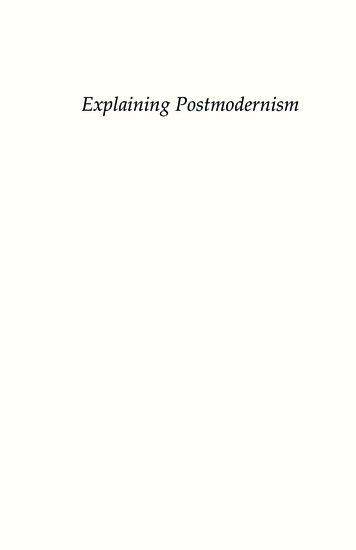
Transcription
Postmodernism and Gender Relations in Feminist TheoryJane FlaxSigns, Vol. 12, No. 4, Within and Without: Women, Gender, and Theory. (Summer, 1987), pp.621-643.Stable URL:http://links.jstor.org/sici?sici O%3B2-LSigns is currently published by The University of Chicago Press.Your use of the JSTOR archive indicates your acceptance of JSTOR's Terms and Conditions of Use, available athttp://www.jstor.org/about/terms.html. JSTOR's Terms and Conditions of Use provides, in part, that unless you have obtainedprior permission, you may not download an entire issue of a journal or multiple copies of articles, and you may use content inthe JSTOR archive only for your personal, non-commercial use.Please contact the publisher regarding any further use of this work. Publisher contact information may be obtained athttp://www.jstor.org/journals/ucpress.html.Each copy of any part of a JSTOR transmission must contain the same copyright notice that appears on the screen or printedpage of such transmission.JSTOR is an independent not-for-profit organization dedicated to and preserving a digital archive of scholarly journals. Formore information regarding JSTOR, please contact support@jstor.org.http://www.jstor.orgFri May 18 13:45:29 2007
POSTMODERNISM A N D GENDERRELATIONS IN FEMINIST THEORYJANE FLAXAs the thought of the world, [philosophy] appears only when actuality is already there cut and dried after its process of formation hasbeen completed. . . . When philosophy paints its grey in grey, thenhas a shape of life grown old. By philosophy's grey in grey it cannotbe rejuvenated but only understood. The owl of Minerva spreads itswings only with the falling of the dusk. [G. W. F. HEGEL,preface toPhilosophy of Right]It seems increasingly probable that Western culture is in the middle of afundamental transformation: a "shape of life" is growing old. In retrospect,this transformation may be as radical (but as gradual) as the shift from amedieval to a modern society. Accordingly, this moment in the history ofthe West is pervaded by profound yet little-comprehended change, uncertainty, and ambivalence. This transitional state makes certain forms ofThis paper has been through many transformations. It was originally written for presentation at the annual meeting of the German Association for American Studies, June 1984,Berlin. Travel to Germany was made possible by a grant from the Volkswagen Foundation. Anearlier version of this paper, entitled "Gender as a Problem: In and for Feminist Theory," willappear in the German journal, AmerikastudienlAmerican Studies. I have been fortunate tohave many attentive readers of this paper whose influences undoubtedly improved it,including Gisela Bock, Sandra Harding, Mervat Hatem, Phyllis Palmer, and Barrie Thorne.[Sigw: Journal of Women in Culture and Society 1987, vol. 12, no. 41Q 1987 by The University of Chicago. All rights resewed. 0097-9740187/1204-0001 0l100
F l u 1 POSTMODERNISMthought possible and necessary, and it excludes others. It generates problems that some philosophies seem to acknowledge and confront better thanothers.I think there are currently three kinds of thinking that best present (andrepresent) our own time "apprehended in thought": psychoanalysis,feminist theory, and postmodern philosophy. These ways of thinkingreflect and are partially constituted by Enlightenment beliefs still prevalent in Western (especially American) culture. At the same time they offerideas and insights that are only possible because of the breakdown ofEnlightenment beliefs under the cumulative pressure of historical eventssuch as the invention of the atomic bomb, the Holocaust, and the war inVietnam. 'Each of these ways of thinking takes as its object of investigation at leastone facet of what has become most problematic in our transitional state:how to understand and (re-)constitute the self, gender, knowledge, socialrelations, and culture without resorting to linear, teleological, hierarchical,holistic, or binary ways of thinking and being.My focus here will be mainly on one of these modes of thinking:feminist theory. I will consider what it could be and reflect upon the goals,logics, and problematics of feminist theorizing as it has been practiced inthe past fifteen years in the West. I will also place such theorizing withinthe social and philosophical contexts ofwhich it is both apart and a critique.I do not mean to claim that feminist theory is a unified or homogeneousdiscourse. Nonetheless, despite the lively and intense controversiesamong persons who identify themselves as practitioners concerning thesubject matter, appropriate methodologies, and desirable outcome offeminist theorizing, it is possible to identify at least some of our underlyinggoals, purposes, and constituting objects.A fundamental goal of feminist theory is (and ought to be) to analyzegender relations: how gender relations are constituted and experiencedand how we think or, equally important, do not think about them.2Thestudy of gender relations includes but is not limited to what are oftenFor a more extended discussion of these claims, see my forthcoming work "Freud'sChildren? Psychoanalysis and Feminism in the Postmodern West."Representative examples offeminist theories include Barbara Smith, e d . , Home Girls:ABlack Feminist Anthology (New York: Kitchen Table: Women of Color Press, 1983); CherrieMoraga and Gloria Anzaldua, eds., This Bridge Called My Back (Watertown, Mass.:Persephone Press, 1981); Elizabeth Abel, Marianne Hirsch, and Elizabeth Langland, TheVoyage In: Fictions of Female Development (Hanover, N. H . , and London: University Press ofNew England, 1983); Zillah R. Eisenstein, ed., Capitalist Patriarchy and the Case forSocialist Feminism (New York: Monthly Review Press, 1979); Annette Kuhn and Ann MarieWolpe, eds., Feminism and Materialism (Boston: Routledge & Kegan Paul, 1978); HunterCollege Women's Studies Collective, Women's Realities, Women's Choices (New York:Oxford University Press, 1983); Elaine Marks and Isabelle de Courtivron, eds., New FrenchFeminisms (New York: Schocken Books, 1981); Joyce Trebilcot, ed., Mothering: Essays inFeminist Theory (Totowa, N . J . :Rowman & Allanheld, 1984); Sherry B. Ortner and Harriet
Summer 1987 / SIGNSconsidered the distinctively feminist issues: the situation ofwomen and theanalysis of male domination. Feminist theory includes an (at least implicit)prescriptive element as well. By studying gender we hope to gain a criticaldistance on existing gender arrangements. This critical distance can helpclear a space in which reevaluating and altering our existing genderarrangements may become more possible.Feminist theory by itself cannot clear such a space. Without feministpolitical actions theories remain inadequate and ineffectual. However, Ihave come to believe that the further development of feminist theory (andhence a better understanding of gender) also depends upon locating ourtheorizing within and drawing more self-consciouslyupon the wider philosophic contexts of which it is both a part and a critique. In other words, weneed to think more about how we think about gender relations or any othersocial relations and about how other modes of thinking can help or hinderus in the development of our own discourses. In this paper, I will bemoving back and forth between thinking about gender relations and thinking about how I am thinking--or could think-about them.Metatheory: Thinking about thinkingFeminist theory seems to me to belong within two, more inclusive, categories with which it has special affinity: the analysis of social relations and. relations enter into and are constituentpostmodern p h i l s o p h yGenderWhitehead, eds., Sexual Meanings: The Cultural Construction of Gender and Sexuality (NewYork: Cambridge University Press, 1981); Nancy C. M. Hartsock, Money, Sex, and Power(New York: Longman, Inc., 1983); Ann Snitow, Christine Stansell and Sharon Thompson,eds., The Powers of Desire: The Politics of Sexuality (New York: Monthly Review Press, 1983);Sandra Harding and Merrill B. Hintikka, eds., Discovering Reality: Feminist Perspectives onEpistemology, Metaphysics, Methodology, and Philosophy of Science (Boston: D. ReidelPublishing Co., 1983);Carol C. Gould, Beyond Domination: New Perspectives on Women andPhilosophy (Totowa, N. J.: Rowman & Allanheld, 1984); Alison M. Jaggar, Feminist Politicsand H u m n Nature (Totowa, N. J.: Rowman & Allanheld, 1983); Isaac D. Balbus, Marxismand Domination (Princeton, N. J.: Princeton University Press, 1982).Sources for and practitioners of postmodernism include Friedrich Nietzsche, On theGenealogy of Morals (New York: Vintage, 1969) and Beyond Good and Evil (New York:Vintage, 1966);Jacques Derrida, L'6criture et la dqference (Paris: Editions du Seuil, 1967);Michel Foucault, Language, Counter-Memory, Practice (Ithaca, N.Y.: Cornell UniversityPress, 1977); Jacques Lacan, Speech and Language in Psychoanalysis (Baltimore: JohnsHopkins University Press, 1968), and The Four Fundamental Concepts of Psychoanalysis(New York: W. W. Norton & Co., 1973);Richard Rorty, Philosophy and the Mirror ofhJature(Princeton, N. J.: Princeton University Press, 1979);Paul Feyerabend, Against Method (NewYork: Schocken Books, 1975); Ludwig Wittgenstein, On Certainty (New York: Harper &Row, 1972), and Philosophical lnoestigations (New York: Macmillan Publishing Co., 1970);Julia Kristeva, "Women's Time," Signs: Journal of Women in Culture and Society 7, no. 1(Autumn 1981): 12-35; and Jean-Fran oisLyotard, The Postmodern Condition (Minneapolis:University of Minnesota Press, 1984).
F l u / POSTMODERNISMelements in every aspect of human experience. In turn, the experience ofgender relations for any person and the structure of gender as a socialcategory are shaped by the interactions of gender relations and other socialrelations such as class and race. Gender relations thus have no fixedessence; they vary both within and over time.As a type of postmodern philosophy, feminist theory reveals and contributes to the growing uncertainty within Western intellectual circlesabout the appropriate grounding and methods for explaining andlor interpreting human experience. Contemporary feminists join other postmodern philosophers in raising important metatheoretical questions about thepossible nature and status of theorizing itself. Given the increasingly fluidand confused status of Western self-understandings, it is not even clearwhat would constitute the basis for satisfactory answers to commonlyagreed upon questions within feminist (or other forms of social) theory.Postmodern discourses are all "deconstructive" in that they seek todistance us from and make us skeptical about beliefs concerning truth,knowledge, power, the self, and language that are often taken for grantedwithin and serve as legitimation for contemporary Western culture.Postmodern philosophers seek to throw into radical doubt beliefs stillprevalent in (especially American) culture but derived from the Enlightenment, such as:1. The existence of a stable, coherent self. Distinctive properties ofthis Enlightenment self include a form of reason capable of privilegedinsight into its own processes and into the "laws of nature."2. Reason and its "science"-philosophy-canprovide an objective,reliable, and universal foundation for knowledge.3. The knowledge acquired from the right use of reason will be"True7'-for example, such knowledge will represent something real andunchanging (universal)about our minds andlor the structure of the naturalworld.4. Reason itself has transcendental and universal qualities. It existsindependently of the self's contingent existence (e.g., bodily, historical,and social experiences do not affect reason's structure or its capacity toproduce atemporal knowledge).5. There are complex connections between reason, autonomy, andfreedom. All claims to truth and rightful authority are to be submitted tothe tribunal of reason. Freedom consists in obedience to laws that conformto the necessary results of the right use of reason. (The rules that are rightfor me as a rational being will necessarily be right for all other such beings.)In obeying such laws, I am obeying my own best transhistorical part(reason) and hence am exercising my own autonomy and ratifying myexistence as a free being. In such acts, I escape a determined or merelycontingent existence.6. By grounding claims to authority in reason, the conflicts between
Summer 1987 / SIGNStruth, knowledge, and power can be overcome. Truth can serve powerwithout distortion; in turn, by utilizing knowledge in the service of powerboth freedom and progress will be assured. Knowledge can be both neutral(e.g., grounded in universal reason, not particular "interests") and alsosocially beneficial.7. Science, as the exemplar of the right use of reason, is also theparadigm for all true knowledge. Science is neutral in its methods and hprocess of discovcontents but socially beneficial in its results. h r o u itsery we can utilize the "laws of nature" for the benefit of society. However,in order for science to progress, scientists must be free to follow the rules ofreason rather than pander to the "interests" arising from outside rationald'iscourse.8. Language is in some sense transparent. Just as the right use ofreason can result in knowledge that represents the real, so, too, language ismerely the medium in and through which such representation occurs.There is a correspondence between "word" and "thing" (as between acorrect truth claim and the real). Objects are not linguistically (or socially)constructed, they are merely made present to consciousness by naming andthe right use of language.The relation of feminist theorizing to the postmodern project of deconstruction is necessarily ambivalent. Enlightenment philosophers such asKant did not intend to include women within the population of thosecapable of attaining freedom from traditional forms of authority. Nonetheless, it is not unreasonable for persons who have been defined as incapableof self-emancipation to insist that concepts such as the autonomy of reason,objective truth, and beneficial progress through scientific discovery oughtto include and be applicable to the capacities and experiences ofwomen aswell as men. It is also appealing, for those who have been excluded, tobelieve that reason will triumph-that those who proclaim such ideas asobjectivity will respond to rational arguments. If there is no objective basisfor distinguishing between true and false beliefs, then it seems that poweralone will determine the outcome of competing truth claims. This is afrightening prospect to those who lack (or are oppressed by) the power ofothers.Nevertheless, despite an understandable attraction to the (apparently)logical, orderly world of the Enlightenment, feminist theory more properly belongs in the terrain of postmodern philosophy. Feminist notions ofthe self, knowledge, and truth are too contradictory to those of the Enlightenment to be contained within its categories. The way(s) to feministfuture(s) cannot lie in reviving or appropriating Enlightenment concepts ofthe person or k n w l e d g e . In "The Instability of the Analytical Categories of Feminist Theory," Signs 11, no. 4(Summer 1986): 645-64, Sandra Harding discusses the ambivalent attraction of feminist
F l u IPOSTMODERNISMFeminist theorists enter into and echo postmodernist discourses as wehave begun to deconstruct notions of reason, knowledge, or the selfand toreveal the effects of the gender arrangements that lay beneath their "neutral" and universalizing facades.' Some feminist theorists, for example,have begun to sense that the motto of Enlightenment, "sapere au&'Have courage to use your own rea on,"' rests in part upon a deeplygender-rooted sense of self and self-deception. The notion that reason isdivorced from "merely contingent" existence still predominates in contemporary Western thought and now appears to mask the embeddedness anddependence of the self upon social relations, as well as the partiality andhistorical specificity of this self's existence. What Kant's self calls its "own"reason and the methods by which reason's contents become present or"self-evident," it now appears, are no freer from empirical contingencythan is the so-called phenomenal self.7In fact, feminists, like other postmodernists, have begun to suspect thatall such transcendental claims reflect and reify the experience of a fewpersons-mostly white, Western males. These transhistoric claims seemplausible to us in part because they reflect important aspects of the experience of those who dominate our social world.A feminist problematicThis excursus into metatheory has now returned us to the opening of mypaper-that the fundamental purpose of feminist theory is to analyze howwe think, or do not think, or avoid thinking about gender. Obviously, then,-theorizing to both sorts of discourse. She insists that feminist theorists should live with theambivalence and retain both discourses for political and philosophical reasons. However, Ithink her argument rests in part on a too uncritical appropriation of a key Enlightenmentequation of knowing, naming, and emancipation.Examples of such work include Alice A. Jardine, Gynesis: Configurations of Woman andModernity (Ithaca, N.Y.: Cornell University Press, 1985);Donna Haraway, "A Manifesto forCyborgs: Science, Technology, and Socialist Feminism in the 1980s," Socialist Review 80(1983):65-107; Kristeva; Kathy E. Ferguson, The Feminist Case against Bureaucracy (Philadelphia: Temple University Press, 1984);and Luce Irigaray, Speculum of the Other Woman(Ithaca, N.Y.: Cornell University Press, 1985).Immanuel Kant, "What Is Enlightenment?' in Foundations of the Metaphysics ofMorals (Indianapolis: Bobbs-Merrill Co., 1959), 85.For critiques of the mind (reason)/body split, see Naomi Scheman, "Individualism andthe Objects of Psychology," in Harding and Hintikka, eds.; Susan Bordo, "The CartesianMasculinization ofThought," Signs 11, no. 3 (Spring 1986):439-56; Nancy C. M. Hartsock,"The Feminist Standpoint: Developing the Ground for a Specifically Feminist HistoricalMaterialism," in Harding and Hintikka, eds.; Caroline Whitbeck, "Afterword to the 'Maternal Instinct,'" in Trebilcot, ed. ; and Dorothy Smith, "A Sociology for Women," in The Prisonof Sex: Essays in the Sociology of Knowledge, ed. J. Sherman and E. T. Beck (Madison:University of Wisconsin Press, 1979).
Summer 1987 1 SIGNSto understand the goals of feminist theory we must consider its centralsubject-gender.Here, however, we immediately plunge into a complicated and controversial morass. For among feminist theorists there is by no meansconsensus on such (apparently) elementary questions as: What is gender?How is it related to anatomical sexual differences? How are gender relations constituted and sustained (in one person's lifetime and more generally as a social experience over time)? How do gender relations relate toother sorts of social relations such as class or race? Do gender relations havea history (or many)? What causes gender relations to change over time?What are the relationships between gender relations, sexuality, and asense of individual identity? What are the relationships between heterosexuality, homosexuality, and gender relations? Are there only two genders? What are the relationships between forms of male dominance andgender relations? Could/would gender relations wither away in egalitariansocieties? Is there anything distinctively male or female in modes ofthought and social relations? If there is, are these distinctions innate and/orsocially constituted? Are gendered distinctions socially useful and/ornecessary? If so, what are the consequences for the feminist goal of attaining gender j u s t i e ? Confronted with such a bewildering set of questions, it is easy tooverlook the fact that a fundamental transformation in social theory hasoccurred. The single most important advance in feminist theory is that theexistence of gender relations has been problematized. Gender can nolonger be treated as a simple, natural fact. The assumption that genderrelations are natural, we can now see, arose from two coinciding circumstances: the unexamined identification and confusion of (anatomical) sexualdifferences with gender relations, and the absence of active feminist movements. I will return to a consideration of the connections between genderrelations and biology later in the paper.Contemporary feminist movements are in part rooted in transformations in social experience that challenge widely shared categories of socialmeaning and explanation. In the United States, such transformationsinclude changes in the structure of the economy, the family, the place ofthe United States in the world system, the declining authority of previously powerful social institutions, and the emergence of political groupsthat have increasingly more divergent ideas and demands concerningjustice, equality, social legislation, and the proper role of the state. In sucha "decentered" and unstable universe it seems plausible to question one ofthe most natural facets ofhuman existence-gender relations. On the otherThese questions are suggested by Judith Stacey, "The New Conservative Feminism,"Feminist Studies 9, no. 3 (Fall 1983): 559-83; and Nancy Chodorow, "Gender, Relation, andDifference in Psychoanalytic Perspective," in The Future of Dgference, ed. Hester Eisenstein and Alice Jardine (1980;reprint, New Brunswick, N.J . :Rutgers University Press, 1985).
F l u I POSTMODERNISMhand, such instability also makes old modes of social relations more attractive. The new right and Ronald Reagan both call upon and reflect a desireto go back to a time when people and countries were in their "proper"place. The conflicts around gender arrangements become both the locusfor and symbols of anxieties about all sorts of social-political ideas, onlysome of which are actually rooted primarily in gender relation . The coexistence of such social transformations and movements makespossible an increasingly radical and social, self-conscious questioning ofpreviously unexamined "facts" and "explanations." Thus, feminist theory,like all other forms of theory (including gender-biased ones), is dependentupon and reflects a certain set of social experiences. Whether, to whatextent, and why feminist theory can be "better" than the gender-biasedtheories it critiques are questions that vex many writers.1 In consideringsuch questions feminist theorists invariably enter the epistemological terrain shared in part with other postmodern philosophies. Hence, I wish tobracket these questions for now in order to consider more closely a fundamental category and object of investigation of feminist theory-genderrelations.Thinking in relations"Gender relations" is a category meant to capture a complex set of socialrelations, to refer to a changing set of historically variable social processes.Gender, both as an analytic category and a social process, is relational. Thatis, gender relations are complex and unstable processes (or temporary"totalities" in the language of dialectics) constituted by and through interrelated parts. These parts are interdependent, that is, each part canhave no meaning or existence without the others.Gender relations are differentiated and (so far) asymmetric divisionsand attributions of human traits and capacities. Through gender relationstwo types of persons are created: man and woman. Man and woman areposited as exclusionary categories. One can be only one gender, never theOn the appeal of new right ideology to women, see Stacey.Harding discusses these problems in detail. Seen. 4 above. See also Sandra Harding, "IsGender a Variable in Conceptions of Rationality? A Survey of Issues," in Gould (n. 2 above),and "Why Has the SexIGender System Become Visible Only Now?'in Harding and Hintikka,eds.; and Jaggar (n. 2 above), 3-53-94. Since within modern Western cultures science is themodel for knowledge and is simultaneously neutrallobjective yet socially usefuYpowerful (ordestructive), much epistemological inquiry has focused on the nature and structure of science.Compare Hilary Rose, "Hand, Brain, and Heart: A Feminist Epistemology for the NaturalSciences," Signs 9, no. 1 (Autumn 1983):72-90; and Helen Longino and Ruth Doell, "Body,Bias, and Behavior: A Comparative Analysis of Reasoning in Two Areas of Biological Science,"Signs 9, no. 2 (Winter 1983): 20627.'O
Summer 1987 / SIGNSother or both. The actual content of being a man or woman and the rigidityof the categories themselves are highly variable across cultures and time.Nevertheless, gender relations so far as we have been able to understandthem have been (more or less) relations of domination. That is, genderrelations have been (more) defined and (imperfectly) controlled by one oftheir interrelated aspects-the man.These relations of domination and the existence of gender relationsthemselves have been concealed in a variety of ways, including definingwomen as a "question" or the "sex" or the "other"" and men as theuniversal (or at least without gender). In a wide variety of cultures anddiscourses, men tend to be seen as free from or as not determined bygender relations. Thus, for example, academics do not explicitly study thepsychology of men or men's history. Male academics do not worry abouthow being men may distort their intellectual work, while women whostudy gender relations are considered suspect (of triviality, if not bias).Only recently have scholars begun to consider the possibility that theremay be at least three histories in every culture-"his," "hers," and "ours.""His" and "ours" are generally assumed to be equivalents, although incontemporary work there might be some recognition of the existence ofthat deviant-woman (e.g., women's history).12However, it is still rare forscholars to search for the pervasive effects of gender relations on all aspectsof a culture in the way that they feel obligated to investigate the impact ofrelations of power or the organization of production.To the extent that feminist discourse defines its problematic as"woman," it, too, ironically privileges the man as unproblematic or exempted from determination by gender relations. From the perspective ofsocial relations, men and women are both prisoners of gender, although inhighly differentiated but interrelated ways. That men appear to be and (inmany cases) are the wardens, or at least the,trustees within a social whole,should not blind us to the extent to which they, too, are governed by therules of gender. (This is not to deny that it matters a great deal-toindividual men, to the women and children sometimes connected to them,and to those concerned about justice-where men as well as women aredistributed within social hierarchies.)13" For example, the Marxist treatments of the "woman question" from Engels onward, orexistentialist, or Lacanian treatment of woman as the "other" to man.l2 On this point, see Joan Kelly, "The Doubled Vision of Feminist Theory," FeministStudies 6, no. 2 (Summer 1979): 21&27; and also Judith Stacey and Barrie Thorne, "TheMissing Feminist Revolution in Sociology," Social Problems 32, no. 4 (April 1985): 301-16.l3 Compare Phyllis Marynick Palmer, "White WomenIBlack Women: The Dualism ofFemale Identity and Experience in the United States," Feminist Studies 9, no. 1 (Spring1983): 151-70.
F l u I POSTMODERNISMFeminist theorizing and deconstructionThe study of gender relations entails at least two levels of analysis: ofgender as a thought construct or category that helps us to make sense out ofparticular social worlds and histories; and of gender as a social relation thatenters into and partially constitutes all other social relations and activities.As a practical social relation, gender can be understood only by closeexamination of the meanings of "male" and "female" and the consequencesof being assigned to one or the other gender within concrete social practices.Obviously, such meanings and practices will vary by culture, age, class,race, and time. We cannot presume a priori that in any particular culturethere will be a single determinant or cause of gender relations, much lessthat we can tell beforehand what this cause (or these causes) might be.Feminist theorists have offered a variety of interesting causal explanationsincluding the "sexlgender system," the organization of production or sexual division of labor, child-rearing practices, and processes of significationor language. These all provide useful hypotheses for the concrete study ofgender relations in particular societies, but each explanatory scheme alsoseems to me to be deeply flawed, inadequate, and overly deterministic.For example, Gayle Rubin locates the origin of gender systems in the"transformation of raw biological sex into gender."14 However, Rubin'sdistinction between sex and gender rests in turn upon a series of oppositions that I find very problematic, including the opposition of "raw biological sexuality" and the social. This opposition reflects the idea predominantin the work of Freud, Lacan, and others that a person is driven by impulsesand needs that are invariant and invariably asocial. This split betweenculture and "natural" sexuality may in fact be rooted in and reflect genderarrangements.As I have argued elsewhere,'' Freud's drive theory reflects in part anunconscious motive: to deny and repress aspects of infantile experiencewhich are relational (e.g., the child's dependence upon and connectednesswith its earliest caregiver, who is almost always a woman). Hence, inutilizing Freud's concepts we must pay attention to what they conceal aswell as reveal, especially the unacknowledged influences of anxieties aboutgender on his supposedly gender-neutral concepts (such as drive theor
and Domination (Princeton, N. J.: Princeton University Press, 1982). Sources for and practitioners of postmodernism include Friedrich Nietzsche, On the Genealogy of Morals (New York: Vintage, 1969) and Beyond Good and Evil (New York: Vintage, 1966); Jacques Derrida, L'6criture et la dqference (Paris: Editions du Seuil, 1967);










